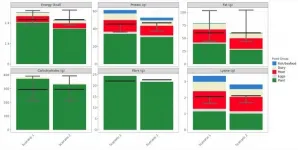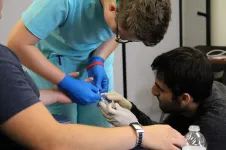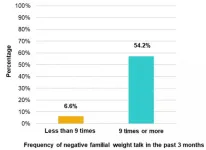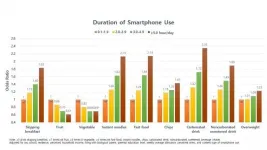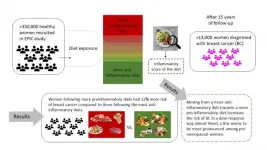(Press-News.org) Rockville, Maryland (June 7, 2021) -- Only 5% of men and 9% of women are getting the recommended daily amount of dietary fiber, according to a study being presented at NUTRITION 2021 LIVE ONLINE. Insufficient fiber intake is associated with a higher risk of heart disease and diabetes, two of the most common diseases in the U.S.
"These findings should remind people to choose fiber-rich foods like whole grains, fruits and vegetables to reduce their risk for heart disease," said Derek Miketinas, PhD, RD, an assistant professor at Texas Woman's University, the study's lead author. "Based on our findings, fewer than 1 in 10 U.S. adults meet their daily recommendations for fiber intake. For those with diabetes, it is especially important to eat enough fiber since they are at a greater risk for heart disease."
Fiber is a type of carbohydrate that passes through the body undigested. Though perhaps best known for its role in supporting regular bowel movements, fiber also carries important benefits for cardiovascular health. Studies suggest dietary fiber can help lower cholesterol, blood pressure and inflammation and help prevent diabetes. It can also improve blood sugar levels for people with diabetes.
The researchers analyzed data from more than 14,600 U.S. adults who participated in the National Health and Nutrition Examination Survey (NHANES) between 2013-2018. Fiber intake was assessed using dietary questionnaires; diabetes status was self-reported and also assessed with hemoglobin A1c (HbA1c) levels. Researchers only analyzed fiber intake from dietary sources, excluding fiber supplements.
"Unlike other similar studies, our analysis estimated Americans' usual fiber intake using advanced statistical methods instead of calculating a simple average," said Miketinas. "This approach is a better indicator of what a person typically eats because it can account for other factors that may influence fiber intake."
Health guidelines recommend eating 14 grams of fiber for every 1,000 calories consumed (g/1,000 kcal) daily. On average, women in the study consumed 9.9 g/1,000 kcal and men consumed 8.7 g/1,000 kcal. Among those with diabetes, women consumed 10.3 g/1,000 kcal and men consumed 9.6 g/1,000 kcal, higher than average but still falling short of recommendations.
To get the right amount of fiber, the typical woman should aim for about 25 grams (for a 2,000 calorie diet), while men should aim for 38 grams (for a 2,500 calorie diet), with lower targets for those over age 50. This typically requires a good mix of fruits, vegetables and whole grains. For perspective, choosing a whole grain such as pearled barley will provide 6 grams of fiber per cup compared to less than 2 grams of fiber in white rice.
In addition to shedding light on Americans' eating habits, Miketinas said the new findings can help inform future research into chronic disease prevention.
"The results of this study can be used to identify relationships between dietary fiber intake and outcomes of interest like risk factors for heart disease," said Miketinas. "In fact, our preliminary analysis suggests that higher dietary fiber intake in adults with diabetes is strongly associated with reductions in markers for heart and kidney disease."
Miketinas will present this research in an on-demand poster session during NUTRITION 2021 LIVE ONLINE from noon on Monday, June 7 through 5:30 p.m. on Friday, June 10 (abstract; presentation details).
Images available.
Please note that abstracts presented at NUTRITION 2021 LIVE ONLINE were evaluated and selected by a committee of experts but have not generally undergone the same peer review process required for publication in a scientific journal. As such, the findings presented should be considered preliminary until a peer-reviewed publication is available.
INFORMATION:
About NUTRITION 2021 LIVE ONLINE
NUTRITION 2021 LIVE ONLINE, held June 7-10, 2021 is a dynamic virtual event showcasing new research findings and timely discussions on food and nutrition. Scientific symposia explore hot topics including clinical and translational nutrition, food science and systems, global and public health, population science and cellular and physiological nutrition and metabolism. https://meeting.nutrition.org #NutritionLiveOnline
About the American Society for Nutrition (ASN)
ASN is the preeminent professional organization for nutrition research scientists and clinicians around the world. Founded in 1928, the society brings together the top nutrition researchers, medical practitioners, policy makers and industry leaders to advance our knowledge and application of nutrition. ASN publishes four peer-reviewed journals and provides education and professional development opportunities to advance nutrition research, practice and education. http://www.nutrition.org
Find more news briefs and tipsheets at: https://www.eurekalert.org/meetings/nutrition/2021/newsroom. Watch on-demand sessions, view posters and more by registering for a END
Rockville, Maryland (June 7, 2021) -- Reducing food waste is crucial to our ability to feed the growing human population but will not fully solve the problem alone, according to a new study based on a computational model.
Researchers calculate that the world already produces enough protein and energy to feed 9.7 billion people--the projected population as of 2050--if food waste were cut in half. However, projections indicate global food production will still fall short in terms of micronutrients that our bodies need to stay healthy, including calcium, iron, vitamin E and others.
"Reducing food waste would give us enough protein and food energy to feed the 2050 population today--but not enough of the essential ...
Rockville, Maryland (June 7, 2021) -- According to a new study, people who eat faster or take larger bites are more likely to eat more at a meal. The research, which is being presented at NUTRITION 2021 LIVE ONLINE, provides new insight into the factors that might contribute to overeating.
The study also adds more evidence that people eat more when given larger portions. The researchers found that study participants ate, on average, 43% more when the portion size of a meal was increased by 75%.
"Although studies have consistently found that people eat more when they are served larger portions, less is known about why this happens or why some people ...
Rockville, Md. (June 7, 2021) - Superfoods like turmeric and honey have long been recognized for their ability to promote health and wellness. New studies being presented at END ...
Rockville, Maryland (June 7, 2021) -- What we eat during childhood can affect the health of individuals--and populations--for years to come. As rates of childhood obesity continue to rise, five studies being presented at NUTRITION 2021 LIVE ONLINE bring new insights into the diets of children and teens around the world.
Families report substantial child weight gain during COVID-19
Researchers at Virginia Commonwealth University surveyed over 400 parents about their children's weight and eating habits before the COVID-19 pandemic and at two points during ...
Rockville, Maryland (June 7, 2021) -- Even moderate smartphone use may influence teens' diet and weight, according to a new study of more than 53,000 Korean adolescents. Teens who used a smartphone for more than 2 hours per day were significantly more likely to eat more junk food and fewer fruits and vegetables than those spending less time on their phone. Teens spending more than 3 hours per day on a smartphone were significantly more likely to be overweight or obese.
"While earlier studies have shown that TV watching is an important factor that increases the risk of obesity in children and adolescents, little is known about the effects of modern screen time such as smartphone use on diet and obesity," said Hannah Oh, ScD, assistant professor at ...
Rockville, Maryland (June 7, 2021) -- Studies being presented at END ...
Rockville, Maryland (June 7, 2021) -- A new study of more than 350,000 women found that women with diets incorporating more foods that increase inflammation in the body had a 12% increase in their risk of breast cancer compared to women who consume more anti-inflammatory diets. The new findings are being presented at NUTRITION 2021 LIVE ONLINE.
The study authors found that moving from a more anti-inflammatory diet toward one that increases inflammation upped breast cancer risk in an almost linear manner. Foods that increase inflammation include red and processed meat; high-fat foods such as butter, margarines and frying fats; and ...
Rockville, Maryland (June 7, 2021) -- What did Americans eat during the Great Recession? A new study suggests dietary quality plummeted along with the economy.
According to the study, adults overall ate more refined grains and solid fats and children increased their intake of added sugar during the recession. The impacts of the downturn were especially pronounced in food-insecure households, where individuals significantly reduced their intake of protein and dark green vegetables while increasing total sugars.
"Overall, we found that the Great Recession had a negative impact on dietary ...
Rockville, Maryland (June 7, 2021) -- There has been a long-standing debate as to whether a low-fat or a plant-centered diet is better at lowering the risk of cardiovascular disease. A new study that followed more than 4,700 people over 30 years, found that a plant-centered diet was associated with a lower long-term risk for cardiovascular disease. However, both diets were linked with lower LDL, or bad cholesterol, levels.
"Since 1980, dietary guidelines in the United States and in Europe have recommended eating low amounts of saturated fat because of the high rates of heart disease in these regions," said research team leader David Jacobs, PhD, from the University of Minnesota. "This is not necessarily wrong, but our study shows that plant-centered ...
Rockville, Maryland (June 7, 2021) -- As COVID-19 spread throughout the world, our daily routines and behaviors changed drastically. A new study of more than 2,000 people in the U.S. found that the pandemic has also affected how we eat. The authors found a decrease in the consumption of many food groups, particularly healthy foods such as vegetables and whole grains, compared to before the pandemic.
"When the pandemic began, we saw panic buying, problems in the food supply chain, increases in food prices and rising unemployment rates," said Caroline Um, PhD, a postdoctoral fellow at ...

